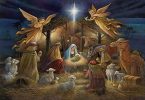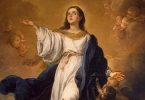Christmas (Midnight)
Scriptures: Is. 9:1-7; Ps. 93:1-3, 11-13; Tit. 2:11-14; Lk. 2:1-14
“Listen, I bring you news of great joy, … Today in the town of David a saviour has been born to you; he is Christ the Lord.” (Lk. 2:10-11)
Two thousand years ago, the angel of the Lord brought this good news to the shepherds. The angel proclaimed the long-awaited promise of God made to several prophets. The truth was deeply rooted in the scriptures and in the faith of the Jews. They were the chosen generation to know the the marvellous plans of God had for the whole human race. In the midnight liturgy, apart from Mary and Joseph, the shepherds dominate the nativity scene. I had this question in my kind for several years: why did God choose the shepherd? Why were they chosen first to know the birth of Christ? Why was the sign to know Christ, revealed to them?
The first reading helps us to understand the mind of God. The prophet Isaiah had prophesied many centuries ago in the time of Assyrians invasion. Tiglath-Pilesar III ruled as a king of Assyria in the eighth century (B.C.). He had annexed the northern kingdom of Israel and they were deported to Assyria. The people lived in extreme conditions. Their lives had become full of darkness. The prophet actually saw the death of Tiglath-Pilesar III and the rise of Hezekiah, son of King Ahaz as a hope to the people of Israel. The words attributed to King Hezekiah are actually fulfilled in the person of Jesus after eight hundred years. He is a child born to us and a son born to us. The dominion is laid on his shoulders. He is called wonder-counsellor, Mighty-God, Eternal-Father, Prince of Peace. These attributes fit Jesus who was in the ancestry of King David.
The selection of the shepherd, points to the fact that their lives were in darkness. They represent the people of Israel. God chose shepherd for many other reasons such as David who was shepherd-king. The shepherd had meek and humble of heart. They were considered outcast among the zealous Jews because they were ceremonially unclean. They were also looked down as dishonest because they pastured their sheep on other people’s land. (Babylonian Talmud, Sanhedrin 25b). They lived among nature so they had to depend on God for their protection. The shepherd would have been the right people to recognise Jesus as the Lamb of God who would give His life for their sins.
However, Raymond Brown gives us great insight from the Lucan perspectives in this infancy narrative. The shepherds are mentioned only in the Gospel of Luke. The mention of Bethlehem is where King David shepherded his flock. It creates the background. Luke referred to the prophet Micah who calls Bethlehem as the city of David. He says, “ And you, O Bethlehem Ephrathah, small to be among the clans of Judah, from you there will come forth for me one who is to be a ruler in Israel.” (Micah 5:1a). Prophet Micah also refers to Migdal Eder, the tower of the flock with Jerusalem.
Luke shifted the terminology to Bethlehem formally applied to Jerusalem. He calls Bethlehem (not Jerusalem) as the city of David. Thus the prophecy of Micah is fulfilled. God restored Israel with the birth of Jesus (tower of the flock) in the city of David. The greetings of the angel to the shepherd are the fulfilment of the prophecy of Micah.
There is yet another reference to this place found in the book of Genesis (35:19-21). It says Rachel had died on the way to Ephrath i.e. Bethlehem. These both the places were considered in pre-Christian Jewish period as a place where the Messiah would be revealed from the tower of the flock. It is supposed to be an Aramaic translation of Migdal Eder.
We learn that God chose not the learned, the rich, the political and religious leaders of the Jewish community but he chose the shepherds. He chose them because he knew that they would appreciate the good news of Jesus’ birth. They had time to listen to the angels. They had so much serenity and silence in their lives. They believed in angels. They carefully listened to the angels. They recognised Jesus as their messiah. They worshipped the baby Jesus. They rejoiced and at last, went around telling everyone about the birth of Jesus. Thus, the shepherds did three important things in their lives: they recognised Jesus as a saviour, they worshipped Jesus and they proclaimed Jesus to the rest of the world.
We are called to be shepherds today in their triple functions. We are called to recognise, worship and proclaim Christ as the saviour of the world. Our lives are not different than the shepherd. We too live in full of darkness for various reasons. We do not have hope of tomorrow. COVID 19 has created havoc in the world. In such trying moments, the church plays the role of angels. It rings the bells, reads the scriptures to proclaim the birth of Jesus. It points to the birth of Christ. Are we ready to listen to this good news of Jesus’ birth? Do we really believe in Jesus as the saviour of the world?
Remember – the shepherd whose lives were full of darkness received the light of Christ. They were filled with joy. If we come before the Christ in manger then we too will find the light to walk in the darkness (first reading), joy in moments of sorrow (Gospel), salvation from the slavery of sins and freedom from the wickedness.
Let us come and bow down before Jesus, the saviour who is born to us today.






